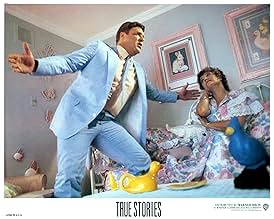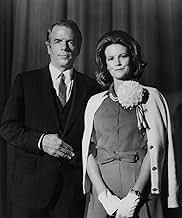Uma pequena, mas crescente cidade do Texas, repleta de personagens estranhos e musicais, celebra seu aniversário de 150 anos e se reúne para um desfile local e show de talentos.Uma pequena, mas crescente cidade do Texas, repleta de personagens estranhos e musicais, celebra seu aniversário de 150 anos e se reúne para um desfile local e show de talentos.Uma pequena, mas crescente cidade do Texas, repleta de personagens estranhos e musicais, celebra seu aniversário de 150 anos e se reúne para um desfile local e show de talentos.
- Direção
- Roteiristas
- Artistas
- Prêmios
- 1 vitória e 2 indicações no total
- Ramon
- (as Humberto 'Tito' Larriva)
- The Little Girl on the Road
- (as Capucine DeWulf)
- Direção
- Roteiristas
- Elenco e equipe completos
- Produção, bilheteria e muito mais no IMDbPro
Avaliações em destaque
Byrne was always a most unusual rock star. The only other musical figure in my mind that comes close is Laurie Anderson, and they were both part of the same scene. Byrne's personality is most intriguing and ambiguous; strange, yet unaffected, nerd-ish, but not nerdy, fascinating, but not theatrical. An outrageous introvert, Byrne is like the odd little boy who instead of playing with the other kids, spends his time tinkering and tooling with his parents' electronics -- except, Byrne is a cultural tinkerer, looking at things from a perspective so delicately skewed that a casual glance might reveal nothing at all out of the ordinary. In this manner, "True Stories" is like a David Lynch film in its depiction of small town weirdness, but where Lynch sees a sinister underbelly to the banal, Byrne remains sunnily ambivalent.
The cinematography here is done by Ed Lachman, who has worked with directors such as Paul Schrader, Werner Herzog, Wim Wenders, and Steven Soderbergh. It echoes David Byrne's own photography in the way it flatly looks at objects and places head-on, revealing irony by being unironic. A lot of critics have accused Byrne -- from his hipster Lower Manhattan pulpit, I guess -- of contempt for small-town America, but is that really evident here? I don't sense that Byrne is ridiculing any of these characters so much as simply regarding them, perhaps even with some degree of affection.
The look and feel of the movie reminds me of Jim Jarmusch's films a bit, but there aren't really any "stories" told here so much as light vignettes. Upon viewing the film for the first time, one might be underwhelmed, but this is the sort of movie that sneaks up on you upon repeated viewings. There's a lot to treasure here. David Byrne stars in the film as the "narrator," a sort of tour guide that Steven H. Scheuer described as a "new age Mr. Rogers" (doesn't Byrne kind of remind you of Mr. Rogers? I mean, what can be said for a rock star that reminds you of Mr. Rogers and makes completely funky music?), showing the viewer around the fictional town of Virgil, Texas. We meet Virgil's various oddball inhabitants. John Goodman is the world's most eligible bachelor, so desperate for matrimony that he places a "Wife Wanted" sign on his front lawn (in the shape of an arrow, with blinking lights) and appears on television in a commercial advertisement, boasting a 1-800 number for interested bachelorettes. Swoozie Kurtz is the world's laziest woman, who hasn't left her bed in about a decade, which is the same length of time for which Earl Culver (Spalding Gray), founder of Virgil-based corporation VeriCorp, has not spoken with his wife, with whom he is happily married. And then there's Mr. Tucker, the town's voodoo priest and part-time caretaker of the world's laziest woman, played by 'Pops' Staples who is a sweet, gentle angel here, and whose "Papa Legba" furnishes the movie with its best musical number. We even get to attend church, where the pastor's sermon is like a compilation of conspiracy theories, questioning the link between Bobby Ray Inman, toilet paper and Elvis, leading into the song "Puzzlin' Evidence."
"True Stories" looks at small town America in a fashion similar to the way Tim Burton looks at suburban USA. With Talking Heads songs as well as original music by Meredith Monk, Kronos Quartet, and others, there's a magical quality that stirs beneath the surface. In possibly the film's best scene, ending in what looks like the most bizarre parody of The Last Supper I've ever seen, Spalding Gray gives an impromptu lecture over dinner about the future of Virgil, exploiting the entrées for metaphors while the dinner china quite literally comes to life to illustrate his points. In his customarily child-like deadpan, Byrne interjects, "Excuse me, Mr. Culver, I've forgotten what these peppers represent."
This film made me think of those historical museums you find in most small towns in America, whose employees are almost always lifelong residents of said small town, speaking with pride and conviction about the importance of their city. These are places for which Byrne clearly has an affinity, and also community centers, shopping malls, taverns, churches, and talent shows.
These places are absurd, yes, but also as wondrous as any theme park.
Although much of Byrne's commentary is at best cryptic or anticlimactic ("Personally, I believe -- I can see Ft. Worth from here."), there is much profundity beneath the absurdism. Byrne's reflections on forgetting are particularly apt.
This is not a film to approach with any expectations. Just watch and absorb, and let what you see percolate in your mind.
John Goodman's character is also the most charming Everyman to grace the screen since Marty.
The music sequences are also among the best I've ever seen.
Rent it and watch it on a big screen TV. Watch sober. Watch under the influence of your favorite mind-altering substance. Watch alone. Watch with friends. Watch when you're alert and rested. Watch when you're tired. Watch again and again.
To try and describe it is something like attempting to nail Jell-O to the wall. There's no plot, really; but there are a lot of things going on, threads of peoples' lives, loosely connected. The film describes itself as being "about a bunch of people in Virgil, Texas" and it is, but actually it's about the wonderful absurdity, lunacy even, of "normal" American life. David Byrne's Narrator character isn't condescending or snide. He's innocent, wondering, matter-of-fact. He looks at the cookie-cutter tract houses and asks, "Who can say it isn't beautiful?"
This is a very unique little movie, and people either seem to get it, or not. I can never predict who will or won't catch the humor. But, if you're not smiling by the end of the intro sequence, this probably isn't the movie for you. Personally, I was laughing my butt off by then. I can't say that this movie made me a better person, but it did add something to my world and gave me a great appreciation for the mind of David Byrne.
Don't compare it to Guffman or any other movie. I doubt Byrne thought of it as any sort of genre piece - in fact it's hardly a movie at all. It's simply what happens when a talented performance artist is given a lot of money.
I weep, however, for Warner Brother's marketing department as they tried to sell it. All in all they failed. Tag line should be: "We gave David Byrne a lot of money to make a movie, come see what he made."
Follow the "external review" link to Roger Ebert's excellent review.
Você sabia?
- Curiosidades50 sets of twins appear in the movie.
- Erros de gravaçãoDisappearing reappearing rearview mirror in the red convertible.
- Citações
Narrator: I really enjoyed forgetting. When I first come to a place, I notice all the little details. I notice the way the sky looks. The color of white paper. The way people walk. Doorknobs. Everything. Then I get used to the place and I don't notice those things anymore. So only by forgetting can I see the place again as it really is.
- Cenas durante ou pós-créditos2. Displayed at very end of credits, below the disclaimer: "IF YOU CAN THINK OF IT, IT EXISTS SOMEWHERE"
- Versões alternativasExtended/re-edited versions of the Wild Wild Life and Love for Sale musical numbers were released as music videos.
- ConexõesEdited into Talking Heads: Wild Wild Life (1986)
Principais escolhas
- How long is True Stories?Fornecido pela Alexa
Detalhes
- Data de lançamento
- País de origem
- Idioma
- Também conhecido como
- True Stories
- Locações de filme
- Empresas de produção
- Consulte mais créditos da empresa na IMDbPro
Bilheteria
- Faturamento bruto nos EUA e Canadá
- US$ 2.545.142
- Faturamento bruto mundial
- US$ 2.545.459
- Tempo de duração1 hora 29 minutos
- Cor
- Proporção
- 1.85 : 1
Contribua para esta página


































